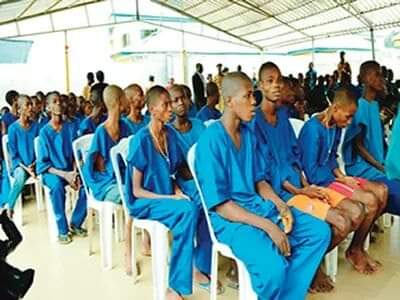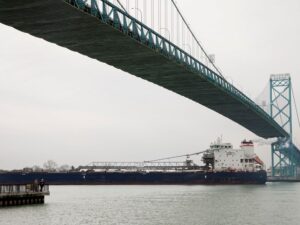
On July 22, members of the Islamic Movement of Nigeria (IMN), popularly known as Shiites, clashed with the police in the Federal Capital Territory (FCT), Abuja, leading to several people being killed and many injured.
The Shiites were protesting the continued incarceration of their leader, Sheik Ibrahim El-Zakzaky. Police eventually arrested 54 of the IMN members.
These 54 members would be charged to court and remanded in prison, while a date will be fixed for hearing and later trial. This may take weeks, sometimes months, if not years. The number of these suspects will swell the number of prison inmates.
Just as police are making countless arrests, including raid of traders, so also is the Economic and Financial Crimes Commission (EFCC), arresting hundreds of suspected fraudsters. Most are remanded in prison custody, giving rise to prison congestion.
The Nigerian Prisons Service (NPS) has expressed worry over the increasing number of those in prisons, disclosing that prison congestion was primarily caused by many inmates not having lawyers.
The prisons’ spokesperson, Francis Enobore, said that almost all the prisons in Nigeria were experiencing congestion.
He said: “At least, we have 60,000 on awaiting trial, otherwise known as the pre-trial detainees. There are about 2,700 that are on condemned list. Port Harcourt Prison, which was built to accommodate 804 inmates, presently has close to 4,000 inmates.”
Enobore, while commending the Nigerian law enforcement agencies saddled with the responsibility of arresting criminal elements, said that questions should be asked on what happens to suspects after arrest, and how fast is the process of prosecution and how it can get to logical conclusion.
He said: “Our interest is that when you arrest people, you try them and those that have no business in prison, you let them go. Let those that should be in prison; be certified by court of competent jurisdiction, that these people are felons. They don’t have the capacity to live in a socialised environment. They should be isolated, trained and re-socialised and then introduced them as certified felons. It is when they are brought to us as certified felons, that we have programmes and trainings for them in prisons.
“We have psychological orientation, job therapists, psychological therapy; even games are introduced to them. There is a limit to which we can expose the inmates in our facilities. For the awaiting trials, like violent criminals, armed robbers and kidnappers, we cannot just bring them out and say that we want to take them to the workshop.
“Someone that kidnapped and demanded a huge sum of money, is that the kind of person, you’ll bring out and want to teach carpentry? But by the time they are taken to court and certified them by giving them maybe like life imprisonment, it means they have given us the right to penetrate and know the causes of their anti-social behaviours and then we’ll set in motion necessary regime to get them re-socialised. This is the gap in the criminal justice system in Nigeria. It should be arrest first, imprisonment and then rehabilitation.”
According to Enobore, Kano Central Prison has a capacity for 750 prisoners, but presently locking 2244, and out of those numbers, 1,452 are those on awaiting trial. He noted that Owerri Prison has a capacity for 908 inmates, but now housing 2,122 prisoners, out of that number, 1,903 are on awaiting trial.
“Port Harcourt Prison has a capacity for 804 inmates, but now has 4,122 prisoners, out of which 3,557 are those on awaiting trial. These pictures are what you find with prisons in urban central across the country. It may interest you to know that there are some prisons that are locking far below their capacities. For example, Gusau Prison, which has capacity for 1,602 inmates, today, has a population that is less than 800. Gusau is not too far from Kano,” Enobore said.
According to him, most times, inmates are transferred to other prisons, but in some situations it is difficult to make such a decision. He cited example of Gusau Prison.
He said: “Normally, inmates should be transferred there, but such cannot happen because most inmates in Kano Prison are those awaiting trial.
“They have to be, by law, close to the court that remanded them in prison. The jurisdiction matters. If you take someone from Kano Prison to Gusau, how will it be possible to move the inmates to and fro? Timing is very important.
“While thanking members of the Nigerian Bar Association (NBA) for their pro-bono services, we want to state that we still need more assistance from them. In Kano Prison, 859 inmates have no legal representations; while in Port Harcourt, 711 inmates have no legal representation. If their families are not able to procure the usually high cost of legal fees, the inmates continue to remain in prison.
“Nigerian Prison Service has no power to tell an inmate that he or she has spent too long a time in prison that the person should go home. We can’t do that! We have to follow due process. We just have to keep advocating for free legal services for these inmates. This is the major way that prison congestion can be reduced.
“The Presidential Committee on Prisons Reform and Decongestion (PCPRD) is trying. It has been going around, releasing inmates in different prisons. Another major problem is that most prison inmates are there for crimes that are not bailable. Even if bail is going to be given, but because of the heinous crime, the trial judge will impose high bail conditions. But I know that with time, we shall find a way round these problems. Right now, advocacy is what we are banking on.”





